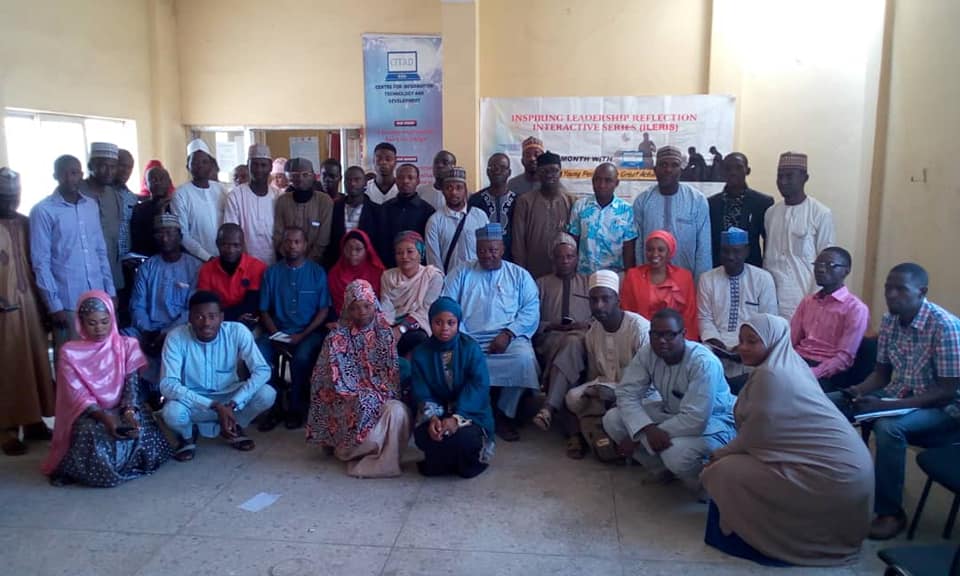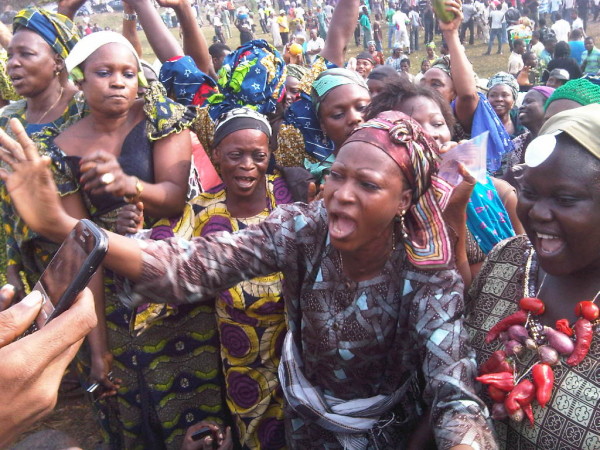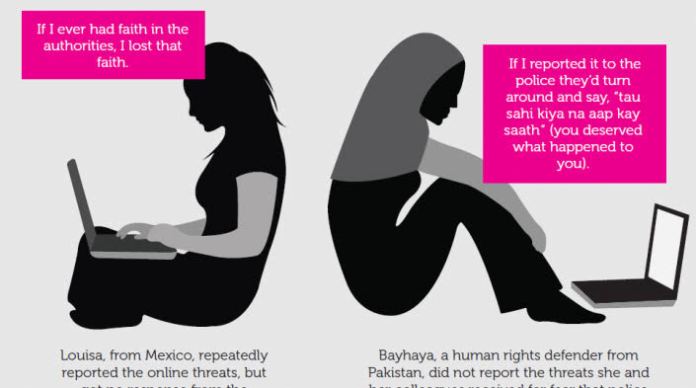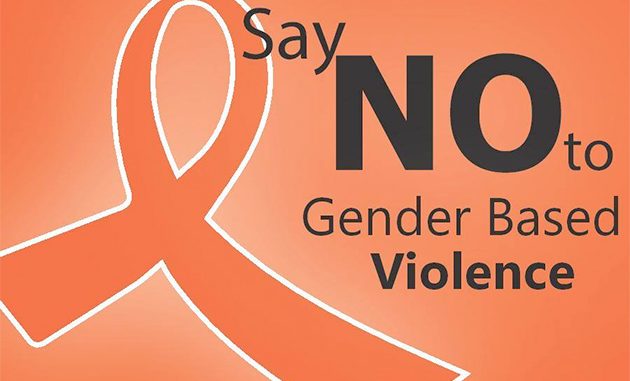Over the years the teaching of philosophical thought, especially in the social sciences and political theory has declined. This has affected the quality of critical thinking of current graduates. Yet, without critical thinking, we get graduates of university who are no more different from students of craft school who narrowly acquired craft skills without understanding the underlying logics of either the skills or the trade they will practice.
in its quest to bring about sustainable development in Nigeria by equipping the youths with a more realistic way of thinking, Center for Information Technology and Development (CITAD) has organised a 3-day Philosophical interactive session for participants from various states in Nigeria. CITAD organised and sponsored the institute in order to engage the younger generations of students and graduates in critical thinking and reasoning and become positive thinkers and also provide them with a guiding principle of resolving their societal problems by instituting an annual institute for philosophical thoughts for young people that will be grounded these aspects of intellectual grooming by getting Ibrahim Muazzam principally, but also many other critical thinkers to facilitate the sessions of institute. The institute also aimed at preparing the participants with a philosophical thinking in an attempt to conquer the lackadaisical attitudes and laziness in acquiring knowledge a reading books which have covered the minds of many Nigerians especially the youths.
The 2nd Edition of the Institute of Philosophy was named after the inspiring mentor, Ibrahim Mu’azzam  of department of Political Science, Bayero  University, Kano. Ibrahim Muazzam has extensive experience teaching political theory, political philosophy, third world theories and other related topics that have continued to influence the critical thinking of many people who have passed through Bayero University, Kano. Many of these courses have either been phased out or that the explosion in student population has made it impossible to maintain the ambience of the past that allowed for debates and more rigorous treatment of many important topics that impact on the critical thinking faculty of students.
The 3-day institute devoted to three key engagements: Â reading of the classical political thought, theory and philosophy through lectures; engagement with current topics of interest such as imperialism in the context of globalization; and debates to shape the intellectual engagement of the participants.
In his opening remarks, the Executive Director of  CITAD,  Dr.  Yunusa  Ya’u stated that  the December 2018 edition of the institute of Philosophy is the second after the maiden edition in January 2018.  He explained that it was established with the view to engage young people to be involved in asking serious and critical question. This was also in line with making them possess a critical mind and thinking in order to develop a deep and better understanding of issues and ideas and enquire for the truth and justice.
Dr. Ya’u also  explained that the institute was not only a academic and philosophical exercise, but to honour someone of high reputable image who has dedicated himself to mentoring and training students. The resourcefulness, versatility, depth of knowledge, roundedness and intellectual robustness of Ibrahim Muazzam is reflected in the glowing nostalgia with which many of his former students and associates reflect on what they took from him on online platforms. CITAD therefore saw a need to provide an avenue for practical discussion and interaction with this renowned philosopher. This resulted into the Ibrahim Mu’azzam Institute of Philosophy.
In his speech, the Executive Director further added that it is also part of the development process to contribute as well try to make people question the system which could help in regaining hope in the country.
Professor Ismaila Zango, who is the Director of the Aminu Kano Centre for Democratic Studies – Mambayya House, welcomed all participants to the institute and assured them of not having only
interesting and exciting discussion with Ibrahim Mu’azzam, but a lot of learning and takeaways. He
ended by wishing the participants a successful and fruitful programme.
At the  beginning  of  the  first day  of  the  institute, the  mentor, Ibrahim  Mu’azzam  stated with explaining  the concept of the  philosophy itself. He described the  term  “Philosophy†as central  to any knowledge-based society, since Philosophy is the key to knowledge. He explained that whenever we search for wisdom, we are being philosophical. Muazzam added that philosophy is explaining concepts based on intellectual capacity. He further explained that Philosophy provides humans with the foundation of knowledge and freedom from rumours and assumptions adding that it encourages people to question and interrogate every idea they come across as there is no understanding without questioning making which makes it an essential aspect of their life. It is a continuous enquiries and not one single one. Philosophy is also how to advance critical thinking in an individual and enquiring for the truth. If we don’t doubt and question, that means we don’t think.
He continued with a lot has happened in this country and people are running away from critical thinking. People have become fond of accepting whatever is been presented to them without question how that position was arrived at. People do not question policies and other decisions passed by the state which are obviously fallible. People do not question budgets that were not executed or poorly executed. It is also very common to find someone possessing one or more degrees without reading a single but whole book relating to his field of study in his entire life. Our leaders also do not acquire knowledge nor do they try to find out the reality of what is happening in the society. They don’t read  books nor do they read  daily newspapers.
He called on the participants to never let others to think for them because that will only give them the opportunity to manipulate people. He said youth must sound philosophical; understand our need, understand our differences and similarities; how the society itself comes into being; and even how were created.
Muazzam emphasized the need for reading. He elaborated reading as engagement to seek for knowledge and not the fanning of papers or reading for leisure or fun. He further added that one of the biggest problems in Nigeria is that the people are not willing to learn their history. In fact people are killing their histories as they don’t want to read  about  it. There  is a chronic dependency. Nigerians including the elites depend a lot on the foreign services including health, education, and information etcetera. People refer and rely to international media and wait for these media to feed them with information about happenings in their locals.
People don’t learn,  adopt and  domesticate,  people  just  adopt foreign  schemes and  ideologies
without considering the differences. This brings about crisis in our process of development.
At the end of the day, he strongly advised that a nation should never let other people think for them and make their culture. People should be the ones to determine and create their political and economic culture and histories not outsiders. He also advised the participants to start reading pointing that there is knowledge in reading. They should set a reading timetable starting from few minutes to hours.
He shouldered the society with the responsibility of finding a way of transforming and channeling the energy possessed and exhibited by the youths in entertainment such as football, music etc, to channel it into critical thinking in issues that matter. Little thinking and reflection are capable of yielding so much good in our society because youths are capable changing the society.
The mentor gave the mentees some text to read and deliberate on before the following day.
In the second day of the Institute, the facilitator began the discussion with the lackadaisical attitudes of the Nigerian youths. Nigerian youths  don’t have focus and don’t even  know themselves properly. Their psych has been taken away from them and therefore unable to make any reasonable or critical thinking. It is not right to say that Nigerians are incapable of thinking. They do think but get it wrong because they are intellectually lazy. Colonialisation has dominated Nigerians’ thinking and  had  made them  mentally lazy. Muazzam emphasized that unless people think outside the box, they cannot have any knowledge. Knowledge is beyond what classroom teaching, but requires additional energy of analysing things beyond their physical appearance.
During the second day interaction, the mentor testified that they are lots of youths who are dedicated and hardworking in Nigeria, but were not able to find hope and support from the society. He explained that becoming a critical thinker also lies in the dreams. While it is a fact that dreams have the potentiality of becoming reality, must of Nigerians do not ream and believe in what they want to become
Thinking outside the box is another parameter for a philosopher. It is very crucial and fundamental to think beyond the level of other people, but Nigerians are lazy and even among the youths, they don’t buy the reading behavior which supposed to make them more vibrant.
One of the factors inhibiting Nigeria’s development also is that they accepted the culture of impunity from those in government. If any political officer would be punished accordingly, the rate of political crimes and or embezzlement would be cut down. It is very important for Nigerians to understand that every government can be impeached for its failure. Another factor is that Nigeria adopts development theories directly from the western countries without domesticating it to Nigerian context.
Muazzam concluded the day by restating the aim of the institute which was to inspire youths in order for them to actualise their dreams, their thoughts and rediscover themselves.
On the third day which was the final day of the institution, they session started with the readings from the texts that were given in the previous day. The discussion lasted until 12:00pm and certificates were presented to all participants.
On behalf of the Executive Director of CITAD, the coordinator of the Institute, Dr. Mohammed Aminu Aliyu thanked all participants for honouring this invitation to learn knowledge. He added that another version of the Institute will soon come up as the programme has already attracted interest of outside the organisation.
While appreciating this effort made by CITAD, many participants expressed their enthusiasm for the programme. They also explained that it is a privilege to be part of this Institute. Among them one participant stated that the Institute of Philosophy has really changed the way they view societal problems and now think both inside and outside the box. All participants have also expressed their appreciation to this effort by CITAD and have promised to utilize what they have learnt effectively. The created an alumni to programme activities that will benefit and engage other youths who were not part of the institute.
Participants’ Profile
The total number of the participants that took part in the 2nd edition of the institute is 35. The participants included lecturers and teachers from different institutions, university graduates, civil servant and members of the civil society drawn from various states across Nigeria.
- Abdulaziz Sani Labaran, BA English, Gombe state.
- Abdullahi Musa Yola, BSc. Criminology, Kano state.
- Abubakar Abubakar Khaleed, PhD Physics, ABU Zaria
- Abubakar Suleiman Dauda, BSc Political Science, Department of Social Studies, FCE Kano.
- Ahmad Muhammad Idris, MSc Geography,
- Bilyaminu Usman Polytechnic, Hadejia, Jigawa
- Aminu Abubakar Isah, BSc Ed Geography, Ahmadu Bello Way, Kano
- Aminu Ali, MSc. Sociology, BUK
- Hafizu Sule Abubakar, LLB, NBA, Dutse, Jigawa state.
- Hauwah Ahmad Said, BSc. Economics, Kano
- Ibrahim Adamu Basirka, MSc Sociology, BUK.
- Ibrahim Sadiq Surajo, BSc Political Science, Hausawa Layout, Kano
- Ibrahim Sulaiman, BA Arch & History, Department of History, BUK
- Ibrahim Waiya, LLB, Kano state.
- Idris Musbahu, BSc. Geography, FCDA Scheme Kubwa, FCT
- Idris Alhassan Alkasim, BSc Pol Science, CAS (KACEPS) Kano
- Jaafar Muhammad Lawan, MSc. Pol Science, Kano
- Jamilu Aminu Ahmad, Master in Power Engr, MBA, Kano
- Khalid Imam, BA Hausa, Kano.
- Mariam Salihu, BSc., Criminology, Enugu
- Maryam Idris Gatawa, BSc Economics, Kano
- Muhammad Muazu Hassan, BSc. Public Administration, Malam Madori, Jigawa
- Murtala Muhammad, PhD, KUST Wudil
- Mustapha Nasiru Muhamad, HND Business Administration, Kano
- Najib Adamu Suleiman, MA, Public Relations, BUK.
- Nasira Suleiman, BSc Criminology, Dutse, Jigawa state.
- Nasir Ingawa, Masters in Public Policy, Asokoro, FCT Abuja
- Said Danna Ali, BSc Sociology & Anthrop, Maiduguri, Borno state.
- Muktar Umar Amin, Diploma English, Kano state.
- Adam Abdulmalik, BA History, Kano state.
- Isyaku Abubakar Musa, Enterprenueship Studies, Kano state.
- Sani Bala Shehu, BA, MPPA, MDS, Kano state.
- Aliyu Dahiru Aliyu, CITAD
- Harira Abdurrahman Wakili, CITAD
- Maryam Ado Haruna, CITAD




